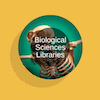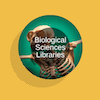The libraries offer a variety of research support to help you develop the skills that you need when working at postgraduate/doctoral level.
Searching for journals & Books please refer to the Searching & Browsing pages
Training, workshops and information
➤ Workshops and training sessions are held in the department
You will be contacted about these directly as they arise.
Slides from previous workshops are available to download here:
➤ Research study skills:
Biological Sciences Study Skills
Biological Sciences Libraries Research Skills Series 2023-2024
Research Skills training by Cambridge University Libraries
7 online modules online.
➤ Managing data
Research data management is an important part of your research and there are many facilities that can help you with this. The first is understanding the importance of planning with a Data Management Plan (DMP) and managing youe Research Data Management (RDM)
For more information on how to write your DMP and managing data RDM, see following links:
➤ Preprint Servers
For general information on the use of preprint servers, read the useful guide from the Office of Scholarly Communication.
bioRxiv is an online archive of unpublished preprints for the life sciences. By publishing here, authors can make their findings immediately available to the scientific community.
arXiv is an open-access archive for several million scholarly articles in the fields of physics, mathematics, computer science, quantitative biology, quantitative finance, statistics, electrical engineering and systems science, and economics
➤ Accessing full text
Lean Library Browser extension to Access full text anywhere
Video promoting the Lean Library
Off-campus easy access (if LeanLibrary extension does not give you access).
- Step 1. Choose the Shibboleth login option.
- Step 2. Select UK Higher Education as your region or group.
- Step 3. Select the University of Cambridge from the list.
- You will then be prompted for your Raven login.
Most staff and students should be able to access e-resources but if you want to make sure, please go to the Test e-resources page. If you can't access it, please contact us.
➤ Open Access
Open Access is simply making published research results freely available to anyone with an internet connection rather than keeping those results hidden behind a subscription paywall.
Making research articles Open Access is a requirement for most funders and for the Research Excellence Framework, or REF. It also ensures that they are more discoverable, more accessible, and therefore more likely to be cited.
The Open Access policy landscape in the UK is complex. The University of Cambridge Open Access team can assist researchers with policy compliance and funder requirements. For information on the changing UKRI policy, see the UKRI Policy page on the Open Access website.
There are two main routes to open access: Green and Gold.
Green Open Access is making a version of work (usually an author's accepted manuscript) available in an open access repository. These can be institutional such as Apollo the Cambridge repository or subject based, such as arXiv, PubMed Central, RePEc or SSRN.
Gold Open Access is open access to the published article via the journal. It can be considered to be 'born Open Access'. Fully Open Access journals often (but not always) charge a fee for publication. The Cambridge University Open Access Policy Framework recommends Green Open Access as the most cost-effective, sustainable way to achieve greater public access to research outputs.
The easiest way to make your articles Open Access is to upload your accepted manuscripts from your Symplectic Elements home page as soon as they're accepted for publication. The University’s Open Access team will then add it to the University Repository for you and advise on any other requirements that might apply.
Where can I find out more?
The Library Team can provide training and one-to-one advice, and you can also find more information on the University of Cambridge Open Access website.





